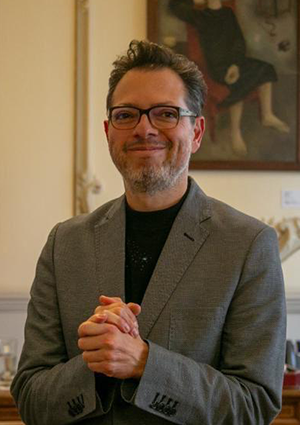Juan David Correa
Juan David Correa, born in Bogotá in 1976, is a literature graduate from the Universidad de Los Andes. He is a journalist, writer, and seasoned cultural manager with extensive experience. In August 2023, President Gustavo Petro appointed Mr. Correa as Minister of Culture. Throughout his career, he has been actively engaged in various aspects of the publishing sector, including roles at the National Library of Colombia and Fundalectura, where he contributed to the development of Colombia's literary and reading landscape.
Mr. Correa's involvement in cultural affairs extends to his editorial contributions to the cultural magazine Arcadia. His work has centered on advocating for and shaping incentive systems within Colombia's cultural policies, particularly in the realm of cinematography, as well as other models for development and reconciliation rooted in culture.
Following his literature studies, he served as a cultural editor for El Espectador. Additionally, he worked as a correspondent in Paris for the same newspaper, where he has maintained the column "Ojo a las hojas" (Watch for the pages) since 2004. Between 2001 and 2002, he was a journalist at Cromos magazine and later served as the press coordinator for Fundalectura, a foundation dedicated to promoting reading in Colombia.
He is the author of the novel "Todo pasa pronto" (Everything passes soon, 2007). In it, amid the crisis and despite the epileptic seizures that afflict him, the narrator recalls and reconstructs the memory of his father, a leftist intellectual who still longs for a social revolution; of his mother, a lawyer from a bourgeois family of Armero; of Gabriel, his baby brother whom he still does not love, and of his many uncles and grandparents. He also wrote "Casi nunca es tarde" (Rarely Too Late, 2015), a story of persecution and accusations set in 1989 in a Colombia marked by massacres, explosions, and disappearances.
He has worked with El Malpensante, SoHo, and the Clarín newspaper in Buenos Aires, among others. He served as the editor of Arcadia magazine from 2005 to 2009, later becoming its director from 2014 to 2018. He also coordinated cultural activities at the National Library. In 2010, he co-founded the independent publishing house El Peregrino Ediciones with Álvaro Robledo. He has been the Cultural Coordinator of the Colombian Chamber of Books since 2011. Following his role as the Cultural Director of the Bogotá International Book Fair (FilBo), he held the position of Literary Director of Grupo Planeta in Colombia for five years until his resignation on July 14, 2023.
Recently, he authored "El barro y el silencio," a literary memoir about the Armero tragedy, which has been translated into Danish by the Aurora Boreal publishing house. In this chronicle, he recalls his grandparents' life in Armero until November 13, 1985, when a mudslide buried the town. Over thirty years later, he reconstructs the story of a family and a region impacted by the tragic convergence of natural forces and government negligence. It is an attempt to understand, a reflection on narrating the tragedy, and an invitation to hear these voices, preserving them from oblivion.
Regarding his appointment as minister, he shared with El Tiempo: "I accept it as recognition to a citizen who has deeply engaged with cultural matters for over 25 years and entrusted with significant responsibility. I perceive this as a clear message from the President, and I must live up to this mission. I am grateful for the solidarity and joy I have received thus far, but as of now, I am just a promise."


